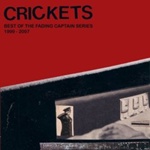Crickets: Best of the Fading Captain Series
reviewed by dave heaton

My first response to Crickets, the two-disc "Best of the Fading Captain Series: 1999-2007" set, which also serves as the 44 th and final entry in that series, was: Has it really been 10 years? And are there really that many recordings in the series? It seems like just the other day when Robert Pollard started the series as an output for the music that wasn't right for Guided by Voices (that's what you do when you're writing new songs nearly every day, and want to get them all out there), kicking it off with Kid Marine, that rock pseudo-opera about a drunken war veteran in Ohio – one of several releases along those lines, and as smashing as the GBV releases of the time. It wasn't the other day, it was 1999. A different time.
Not that Pollard's prolific proclivities should be a surprise to me, or anyone, by now. It's what he's known for, for better or worse. For worse mostly because so many people tend to write off anything he does without "Guided by Voices" stamped on it.. It's an understandable defense mechanism – understandable because it's hard to keep up with that much music from one person, or that much music by any number of people, really. And understandable because he has released plenty of music (or non-music, like the two "comedy" albums) that's hard for even longtime fans like myself to sit through – music that particularly screams "you sucker, you'll buy anything I put out, no matter how much it costs or how terrible it is!"
The shame about that is how many of Pollard's non-GBV releases are, frankly, amazing. Crickets is the proof if you need it. I'd be curious to know who picked the songs for this, because whoever did it was right on the money – wading through the 44 FCS releases (from 7"s to boxsets) and pulling out the true gems, then assembling them as a tight (a strange word for two-disc, 56-song collection, but accurate) and undeniably listenable (another precise word, given Pollard's habit of , say, placing a gorgeous pop single in between meandering noise and clips of his goofball friends leaving answering machines for each other.
Songs from Kid Marine, Speak Kindly of Your Local Volunteer Fire Department, Lexo and the Leapers, Go Back Snowball, Airport 5, Choreographed Man of War, Motel of Fools and Lifeguards rank right up there with the best of GBV. In many cases they are even more interesting than later GBV, because they seem in no way tainted by dreams of commercial success. They're more collaborative (and yes, Pollard's unusual collaboration-by-mail method is still collaboration, and potentially more fruitful, the way structure guides creativity in unlikely directions). More daring. Less overtly hooky, but not necessarily so. As a whole Crickets seems particularly 'pop', more than you'd expect for so-called "side project" material. Pop in sometimes straight-up smack you in the face with melody ways, and sometimes in stranger, more challenging ways. Listen both to the blatant hooks of "Time Machines", "Pop Zeus", "Total Exposure" or "It Is Divine", and to the less obvious but in that way maybe even more portent ones on "The Naked Wall", "Flings of the Waistcoat Crowd", "I'm Dirty" and that weird barbershop pop number "Zoom (It Happens All Over the World)". Or listen to the even more jaw-dropping, complex songs like"Harrison Adams", "Alone, Stinking and Unafraid" and "Instrument Beetle". Sweet pleasures and darker ones, Crickets has them all. Angst and apathy, lust and loneliness, wistfulness and drive. And above all, creativity.
Listening to these all together should make any one re-evaluate their opinion on Pollard's non-GBV recordings. It's certainly made me think about all this music again, to hear it in a different light. I'm reminded of how great some of the least-hyped recordings are: the Motel of Fools EP, that beautiful sort-of 'prog' Lifeguards album, the Go Back Snowball collaboration with Mac Macaughan (which pushed Pollard in a different stylistic directions than anything else, before or after), and even both Airport 5 albums (though this collection shifts towards the first, more accessible one). And the songs selected have make me think even the recordings I was harder on should be given enough visit. The three Blues and Boogie Shoes songs shine nicely, the Fiction Man songs blend in well; even the Moping Swans songs sound good in this context.. Each disc has a few new unreleased songs tacked on at the end, no doubt to attract the completists. These are hit-and-miss in a typically Pollard way, something that the rest of this collection, truly a "best of", is not. But they too have their place. The title of the last song (in addition to being a title Pollard once talked about using for an album) acknowledges the Pollard credo of putting the bad out with the good: "The Power of Suck". Not being afraid to suck isn't a bad credo, when it means not shying away from soaring, either. Plenty of haters, and fans too, have over the years proclaimed that Pollard needs to release less music, that he should put out only "the good stuff" (as if what's "good" is an objective fact). By that logic, most of these Fading Captain Series releases would never have existed. And the world would be a worse place for it, I think. It should take even the most fair-weather Pollard fan (or rock fan, or music fan) only the quickest listen to Crickets to agree.
Copyright (c) 2007 erasing clouds |
|